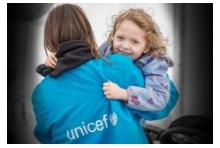Today, millions of children continue to be caught in humanitarian crises that are growing in complexity and scale. Over 473 million children now live in areas affected by conflict. In conflict and disaster, children suffer first and most and are especially vulnerable to disease, malnutrition, and violence.
UNICEF works to protect and assist children during emergencies, including refugee and migrant children, children caught in conflict and those affected by natural hazards such as earthquakes, floods, and landslides. We are present in over 190 countries and territories before, during, and after emergencies, preparing, responding, and re-building with local communities.
Examples of UNICEF’s humanitarian response include:
State of Palestine: The aid blockade since March 2025, combined with more than 18 months of war and surging hostilities has caused devastating physical and mental impacts on children and their families in the State of Palestine, including alarmingly high casualties and displacement. UNICEF and partners are addressing the humanitarian needs of children and their families in a challenging humanitarian and security situation. During the January to March ceasefire, UNICEF scaled up its response and delivered nearly 1,000 truckloads of life-saving supplies into the Gaza Strip. UNICEF and partners had provided safe water to over 1.5 million people, cash assistance to 133,189 people, treated over 6,300 children for acute malnutrition, and vaccinated nearly 603,000 children with polio vaccine.
Sudan: Ongoing conflict in Sudan has created one of the world’s largest humanitarian crises for children. Over 15 million children are in need of humanitarian assistance, with 11.3 million people displaced. As of March 2025, UNICEF and partners have screened 1.7 million children under five for malnutrition, with over 100,000 admitted for treatment of severe acute malnutrition, reached 1.2 million children with education opportunities, and provided mental health and psychosocial support to 1.4 million children and caregivers. UNICEF also helped 3 million people gain access to safe water and delivered 850,000 vaccines.
Ukraine: UNICEF has been present in Ukraine since 1997 and expanded humanitarian assistance for children and families after the escalation of the war over three years ago. In 2025, UNICEF helped over 1.7 million people access safe water, reached more than 85,000 children with education support, and provided mental health and psychosocial care to over 44,000 children and caregivers, and equipped 900 health facilities received vaccine storage equipment. Inside Ukraine, UNICEF is ensuring children have access to health care, nutrition, education, safe water, mental health support, and more. In refugee hosting countries, UNICEF works with governments and local partners to strengthen national systems that provide refugee children and marginalized children from host communities with quality education, healthcare, and protection services.
From to Yemen to Myanmar, Democratic Republic of Congo to Syria, UNICEF is relentlessly responding to emergencies in countries around the world. With your support UNICEF can continue this critical work providing children with lifesaving services.
